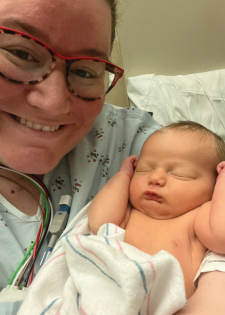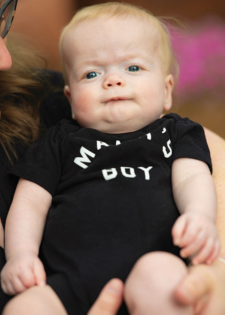When Kaylee and Zack Cargle found out they were expecting their first child, there was nothing but joy in their lives.
The couple had always been told that it would be difficult — if not impossible — to conceive a child. Despite discovering that she was pregnant in August 2022 while recovering from COVID-19, her doctors assured her that her pregnancy would not be affected.
As the weeks and months passed, their growing excitement mounted until a routine doctor visit changed everything.
“Zack and I ran in the same circle of friends and I really met him through my best friend Amy,” Cargle said. “We started dating after Amy’s wedding when Amy’s mom told Zack ‘enough already, go ask her out’ and it just worked.”
Getting pregnant was supposed to be hard for Cargle — she’d previously been diagnosed with polycystic ovarian syndrome (PCOS). PCOS is a hormone condition that can make it harder to become pregnant. It can cause irregular periods, excess hair growth and put women at risk for other conditions like diabetes and high blood pressure.
“I thought that I would have a hard time getting pregnant with PCOS, so we were surprised it happened so quickly,” Cargle said. “I have had so many problems, and getting diagnosed with PCOS can be difficult. I had a great gynecologist when I was 18 years old who took the time to listen to me. She was very much ‘women forward’ in her thinking and I was not dismissed like so many people are who may have PCOS. They are often told all their problems will be fixed by just losing weight and that’s not true.”
Cargle started treatment for PCOS her freshman year of college and, despite having a dedicated doctor and the right diagnosis, she still struggled with some of the symptoms of PCOS and the side effects of some of the treatments.
“It’s hard to talk about it honestly,” Cargle said. “The weight gain, the excess facial hair that can happen. But these things need to be talked about. I was also on the verge of being pre-diabetic as well. I also had a weird thing where my feet would swell all the time. It’s related to the other stuff, it’s just one additional challenge I’ve had with my body. PCOS isn’t talked about enough and it needs to be. It helps so much to have doctors who want to listen to you and help you through what you’re dealing with.”
While recovering from COVID-19, Cargle noticed that she still wasn’t feeling like she normally did. Even her missed periods were not an unusual occurrence due to her PCOS. She began to think, “what if…?”
“Since we had been tracking my ovulation in order to help our odds, the kits also came with pregnancy tests,” Cargle said. “I thought I’d been pregnant the month before, but I wasn’t. I took the test and couldn’t believe what I was seeing: It was two lines instead of one. My husband was still sound asleep and I ran out there waving this stick in my hand yelling, ‘Zack, Zack, Zack, Zack, Zack!’ He was so excited when he woke up to realize what I was saying.”
Navigating the unexpected
Tiffany Stanfill, MD, of Tanner Healthcare for Women in Villa Rica, assured Cargle that her recent recovery from COVID-19 should have no repercussions on her pregnancy, but there was one danger on the horizon that Cargle did not see coming: preeclampsia.
Preeclampsia’s biggest symptom is high blood pressure. It begins after 20 weeks of pregnancy in women whose blood pressure had previously been in the standard range. Untreated, it can lead to serious or fatal complications for both the mother and baby.
Along with high blood pressure, preeclampsia signs and symptoms may include:
- Excess protein in urine or other signs of kidney problems
- Decreased levels of platelets in blood
- Increased liver enzymes that indicate liver problems
- Severe headaches
- Changes in vision, including temporary loss of vision, blurred vision or light sensitivity, floaters in the eyes
- Shortness of breath, caused by fluid in the lungs
“We made it to week 32 with a textbook pregnancy,” Cargle said. “I had two appointments near that time where I had slightly elevated blood pressure. I deal with swelling in my feet and legs regularly and I knew that it would get worse with pregnancy, and it did.
“It was a Monday when Dr. Stanfill wanted me to do the 24-hour urine test. We were on our way to Charleston for a short trip that my parents received as a Christmas gift. She said it was OK to go but to take it easy. About two and a half hours into the drive, Dr. Stanfill called and told me that I had preeclampsia. It wasn’t bad enough for me to cancel the trip, but I did need to be careful.”
When Cargle returned, she began seeing her care team twice per week and was put on modified bedrest. She also began medication to help control her blood pressure and learned to take her blood pressure at home.
Additionally, she began taking shots to help mature her baby’s lungs in case of a premature delivery. On March 8, 2022, Cargle was in the waiting room for her scheduled appointment and started feeling unwell. Her care team admitted her for observation.
“We had a little freak out and we called our parents,” Cargle said. “We knew this might be a possibility, but it was still unnerving. We had planned on an early induction around 37 weeks due to my hypertension, but moving that date up was scary. I had to stay in the hospital from then on. We had ups and downs. I missed my brother and sister-in-law’s wedding. I watched it online but I cried the whole time. They came in to take my blood pressure while the ceremony was starting and they couldn’t get a good read because I was a mess. I was sad and happy at the same time.”

Cargle finally made it to her induction date, but it was not easy. By that time the protein in her urine was in the 4,000 range and she was carrying more than 30 pounds of extra fluid on her body, making it impossible to walk.
“It looked like I had a water balloon on my belly under where the baby sat,” Cargle said. “My hands were so swollen that I couldn’t make a fist. I hadn’t hardly moved at all and now it was time to have a baby. It was like being on the couch for years and then getting up to run a full marathon.”
To make a tense situation even more harrowing, during the delivery the cord became wrapped around the baby’s neck.
“I try to joke when a situation is hard,” Cargle said. “That’s how I cope and deal with it. Between pushes I was trying to make jokes because it made me feel better.”
After two and a half hours, Dr. Stanfill told Cargle that she could have three more pushes along with the use of a vacuum and that if the baby still wasn’t moving along as it should, they would have to have a C-section.
“Thankfully, with the help of the vacuum, those pushes were all we needed,” Cargle said. “It was also heartbreaking because Henry didn’t cry and was gray. We knew he had a heartbeat and I held him for a few seconds on my chest before he was taken to the nursery. We were all crying because the thing you wanted to hear most was that cry and we didn’t hear it.”
Cargle said the staff at the Maternity Center at Tanner Medical Center/Villa Rica were the most kind and caring group of people in the world. She’s grateful for their care of Henry.
Despite being a little jaundiced, Henry would be fine — but Cargle was not out of the woods.
Cargle developed pneumonia because she had aspirated at some point. While Henry was born on March 19, Cargle would remain hospitalized another week.
A grateful heart
“God was very good to us,” Cargle said. “God had us at the right place with the right doctors. We knew we were in good hands. I can’t say enough about Dr. Stanfill. She just cares so much. I think she even traded weekends with another doctor just so she could be there for my delivery. She would check on me even when it wasn’t her rounds to be making. She listened to me and to all my fears. She is so passionate about what she does and she cares about her patients. She has so much heart.”
Cargle also said that Dr. Stanfill was mindful of Cargle’s anxiety — something she’d been dealing with even before her pregnancy.
“She remained calm, cool and collected,” Cargle said. “She would always be honest with me but would never talk to me in a way that would add to my anxiety.”

Cargle has nothing but praise for the entire staff at the Maternity Center at Tanner Medical Center/Villa Rica, especially the nurses. She said that even when it wasn’t their “time” to have her as a patient, they would still drop by and check in on her.
“They are all incredible,” Cargle said. “God knew I needed Dr. Stanfill with me in this process and the staff at Tanner.”
Cargle isn’t sure when they will add another baby to their family, but Dr. Stanfill assured her that she would be with her as they now know what to watch out for when they decide to do so.
“I know I can put my complete trust in her and in the Tanner staff,” Cargle said. “Some of the nursing staff had also dealt with preeclampsia in their own pregnancies and they would just come by and talk to me and tell me they understood what I was going through. That is something you can’t teach in a classroom, that compassion for patients and a willingness to step outside a daily duty and come to you on a personal level. I could not have made it without that encouragement.”
Learn more about Tanner Healthcare for Women — including the health system’s maternity and NICU services — at TannerWomensCare.org.